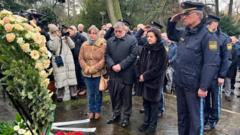Following a deadly knife assault that claimed the lives of a toddler and an adult in Bavaria, key political figures in Germany are advocating for tighter border controls and significant changes to asylum regulations. Friedrich Merz, poised to lead the conservative opposition, has promised immediate action to close borders to irregular migrants, while Chancellor Olaf Scholz condemned the attack as an "act of terror" and vowed swift responses.
German Leaders Call for Stringent Border Controls Following Fatal Knife Attack

German Leaders Call for Stringent Border Controls Following Fatal Knife Attack
In the wake of a tragic knife attack in Aschaffenburg, Germany's political landscape shifts as leaders propose strict immigration policies ahead of the federal elections.
Article Text:
The tragic knife attack in Aschaffenburg, which left a two-year-old boy of Moroccan descent and a 41-year-old man dead, has sparked an intense political response in Germany. In its aftermath, Friedrich Merz, the conservative opposition leader projected to take the helm following next month’s elections, has pledged sweeping changes to the country's border and asylum policies.
In an outspoken declaration, Merz indicated that he would close Germany's borders to all irregular migrants including those eligible for protection. The attack, which also injured multiple victims, including a young Syrian girl, was attributed to a 28-year-old Afghan man who had previously faced violence allegations and had been living in asylum accommodation.
The timing of the attack is critical as it has prompted immediate condemnation from both Merz and Chancellor Olaf Scholz. Scholz labeled the incident an "act of terror," although no terrorism link has been established by officials. Merz, leading current opinion polls for the February 23 federal elections, asserted that such violence would not become a "new normal," referencing previous attacks throughout the year.
The Afghan suspect had entered Germany in 2022, and following his prior acts of violence, was expected to leave the country. A judge is now determining whether he should face custody or psychiatric evaluation following the stabbings.
Merz outlined his plans for controlling borders, stating he would assign the interior ministry to take decisive measures. He criticized past immigration policies under Angela Merkel's administration, which had allowed a significant influx of refugees during the European migrant crisis.
With a backdrop of increasing far-right sentiment in Germany, exemplified by the rising popularity of the Alternative for Germany (AfD), Merz's proposals have gained traction. The AfD has called for immediate parliamentary votes to close borders and halt irregular migrations.
This rightward shift in response to public safety concerns is met with skepticism from other political factions. Some lawmakers, including those from the ruling coalition, have cautioned against using tragic events to propel a populist agenda that may inadvertently support the far-right.
Indeed, the tragic events at Aschaffenburg have reignited the national discourse on immigration and public safety, setting the stage for contentious discussions as the country approaches a pivotal election. As the political debate unravels, the lives lost in the knife attack serve as a grim reminder of the ongoing tensions surrounding asylum and border policies in Germany.
The tragic knife attack in Aschaffenburg, which left a two-year-old boy of Moroccan descent and a 41-year-old man dead, has sparked an intense political response in Germany. In its aftermath, Friedrich Merz, the conservative opposition leader projected to take the helm following next month’s elections, has pledged sweeping changes to the country's border and asylum policies.
In an outspoken declaration, Merz indicated that he would close Germany's borders to all irregular migrants including those eligible for protection. The attack, which also injured multiple victims, including a young Syrian girl, was attributed to a 28-year-old Afghan man who had previously faced violence allegations and had been living in asylum accommodation.
The timing of the attack is critical as it has prompted immediate condemnation from both Merz and Chancellor Olaf Scholz. Scholz labeled the incident an "act of terror," although no terrorism link has been established by officials. Merz, leading current opinion polls for the February 23 federal elections, asserted that such violence would not become a "new normal," referencing previous attacks throughout the year.
The Afghan suspect had entered Germany in 2022, and following his prior acts of violence, was expected to leave the country. A judge is now determining whether he should face custody or psychiatric evaluation following the stabbings.
Merz outlined his plans for controlling borders, stating he would assign the interior ministry to take decisive measures. He criticized past immigration policies under Angela Merkel's administration, which had allowed a significant influx of refugees during the European migrant crisis.
With a backdrop of increasing far-right sentiment in Germany, exemplified by the rising popularity of the Alternative for Germany (AfD), Merz's proposals have gained traction. The AfD has called for immediate parliamentary votes to close borders and halt irregular migrations.
This rightward shift in response to public safety concerns is met with skepticism from other political factions. Some lawmakers, including those from the ruling coalition, have cautioned against using tragic events to propel a populist agenda that may inadvertently support the far-right.
Indeed, the tragic events at Aschaffenburg have reignited the national discourse on immigration and public safety, setting the stage for contentious discussions as the country approaches a pivotal election. As the political debate unravels, the lives lost in the knife attack serve as a grim reminder of the ongoing tensions surrounding asylum and border policies in Germany.




















